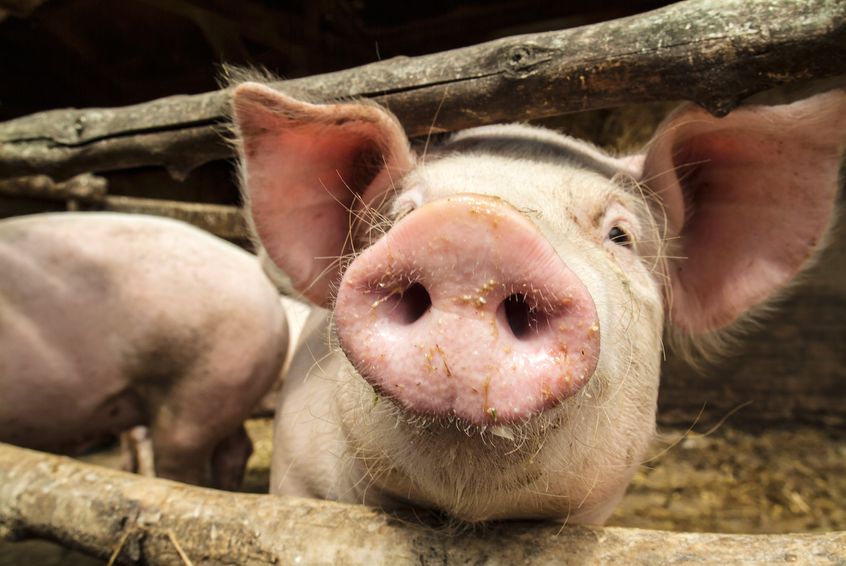
The volume of pigmeat leaving UK abattoirs this year has been lower than 2019 levels, a contributory factor in the firmness of farmgate prices, according to Quality Meat Scotland.
However, June and July broke this trend with year-on-year increases in production which, in turn, led to farmgate prices softening, QMS said in its latest commentary update.
“Latest estimates for UK production show volumes have once again dipped below year earlier levels," said Stuart Ashworth, Director of Economics Services at QMS.
“Despite this slight tightening in supplies, UK prices have continued to drift downwards through August and into September.
“Nevertheless, pig producers find farmgate prices remain 5% higher than last year and 9% higher than in 2018, with heavier carcase weights resulting in larger increases in the value of each pig sold,” he added.
In contrast to the UK average farmgate prices, across Europe they are much lower than last year, and also much lower than the five-year average.
“With the UK price significantly higher than elsewhere in Europe, some of the fall in UK prices, despite lower production, may be accounted for by competitiveness of European prices," he said.
In this regard, UK pigmeat producers are keeping a wary eye on the implications of the conformation of African swine fever (ASF) in Germany.
Although not unexpected because of the presence of ASF in Poland, close to the German border, the conformation of ASF in Germany could be very destabilising for the European and UK market.
One consequence of ASF is that most importers of pig meat immediately suspend all imports from countries with ASF. This has proven to be the case with significant importers of German pigmeat like China, Japan, South Korea all suspending imports from Germany.
Germany is hoping that China, in particular, may be persuaded to adopt a regionalization policy where regions within a country can be considered to be ASF-free and trade can continue and mitigate the impact of the restrictions on exporting to China and elsewhere.
“This is the policy adopted internally within the EU and which would allow pigmeat from some parts of Germany to be exported to EU countries,” said Mr Ashworth.
“As the UK is still transitioning out of the EU, current EU rules still apply and, consequently, German pigmeat could continue to be available in the UK,” he added.
Germany is the largest pigmeat producer in Europe, and the second largest European exporter of pig meat to markets outside the EU.
Estimates of German pork exports outside of the EU are put at 9% of all German production and 2% of European production.
Such significant disruption to trade has, not surprisingly, hit German farmgate prices. Just a week on from ASF being confirmed in the country, abattoirs are quoting prices 14% lower than last week.
Increasing the volume of German pigmeat on the European market by 2% is likely to have some impact on producer prices more widely than just in Germany.
“For the UK, the impact is likely to be felt first in the cull sow sector because Germany is an important market for UK sow meat,” said Mr Ashworth.
“However, for the UK and other major pig producing states of Europe who do not have ASF, like Denmark, Holland, France and Spain, domestic prices may be supported by replacing German exports in China, Japan and South Korea."
A further mitigating factor may prove to come from the recent, rapid growth in EU pigmeat exports.
EU exports, excluding those from the UK, increased by 750,000 tonnes in 2019 and continued to grow in the first half of 2020 while, at the same time, production declined slightly and European consumption of pigmeat fell.
“Consequently, with other EU countries well-placed to take some of the room in international markets left by Germany, an increased volume of German pigmeat on the European market may not significantly increase the overall volume of pigmeat on the European market,” said Mr Ashworth.
He added that this could limit any price fall needed to balance supply and demand across Europe.
“However, in turn, this may depend on whether previously large importers from Germany look to secure their requirements from elsewhere in Europe or to competitors such as Brazil, Canada or the USA.
“Nevertheless, in the short-term, farmgate prices across Europe are like to come under pressure until the inevitable consequences of Germany being prevented from exporting pig meat outside of the EU, become clearer,” concluded Mr Ashworth.
